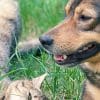Why Do Dogs Eat Cat Poop?
Dogs, despite being intelligent and clean creatures, sometimes exhibit behaviors that are perplexing and repulsive, such as coprophagia, or the consumption of feces, primarily from cats. This habit often leaves dog owners in shock and disgust, leading them to question whether this behavior is harmful to their pets. This article aims to explore the reasons behind dogs eating cat feces, the potential risks involved, and the solutions to curb this behavior.
Key Takeaways – Why Do Dogs Eat Cat Poop?
- Understanding Coprophagia: It is crucial to understand that coprophagia can be a natural behavior for dogs due to their scavenging nature.
- Addressing Underlying Issues: Identifying and addressing underlying medical or behavioral issues is essential in managing coprophagia.
- Preventive Measures: Implementing preventive measures such as dietary adjustments and using dog-proof litter boxes can help in curbing this behavior.
https://www.youtube.com/watch?v=Dg_Zjfkbiwg
The Science behind Canine Coprophagia
Historically, the ancestors of modern dogs were scavengers, consuming everything from live prey to feces and other organic remnants. Consuming the semi-digested food from the stomach and bowels of their prey was a natural part of their diet, making the consumption of cat feces somewhat natural for modern dogs.
/10/ECO093_June_Blog_1024x400.jpg)
What Is Coprophagia?
Coprophagia refers to the consumption of feces, a behavior observed in several animal species, including dogs. This behavior can be instinctual, as seen when mother dogs consume their puppies’ feces to eliminate odors that may attract predators. However, domestic dogs sometimes consume the fresh feces of other animals, like cats, not solely based on instincts but also treating it as a food source.
Reasons Dogs Consume Cat Feces
The motivations behind coprophagia can be categorized into pathological and non-pathological reasons. Understanding the specific reason is crucial as it may indicate underlying health conditions requiring medical intervention.
- Boredom: A lack of stimulation can lead dogs to consume cat feces as a form of entertainment, similar to humans snacking out of boredom.
- Nutritional Deficiency: Some health conditions and a lack of certain nutrients can lead to an increased appetite in dogs, causing them to eat almost anything accessible. See healthy dog food here.
- Stress and Anxiety: Significant changes or stressful situations can lead to compulsive behaviors in dogs, including the consumption of unusual items.
- Survival Instincts: The consumption of feces can be traced back to the survival instincts of wild canines, where it served multiple purposes, including eliminating odors and as a last resort for food.
- Taste Preference: Some dogs may simply prefer the taste of cat feces, especially if they enjoy cat food, due to the high protein and fat content.
Risks Involved:
- Consuming cat poop can expose dogs to harmful bacteria and parasites, leading to various infections and illnesses.
- The ingestion of cat litter along with the feces can cause internal blockages and damage, necessitating veterinary intervention.
Preventive Measures for Coprophagia
- Dietary Adjustments: Adding variety and essential nutrients to a dog’s diet can reduce the appeal of cat feces.
- Dog-Proof Litter Boxes: Utilizing litter boxes inaccessible to dogs can prevent them from reaching the cat feces.
- Use of E-Fences: Electronic fences can help in setting boundaries and preventing dogs from accessing litter boxes.
- Regular Cleaning of Litter Boxes: Maintaining cleanliness can prevent dogs from accessing cat feces.
- Use of Deterrents: Adding substances like black pepper or hot sauce, which are repulsive to dogs, can make cat feces unappealing.
Unique Facts about Coprophagia
- Fact 1: Coprophagia can be a sign of underlying medical conditions such as diabetes mellitus, intestinal parasites, or Cushing’s disease.
- Fact 2: Some dogs might eat cat feces as a way to get attention or avoid punishment.
- Fact 3: The ingestion of cat litter along with feces can lead to internal blockages and damage.
FAQs
Q: Is coprophagia harmful to dogs?
A: While generally not severely harmful, it can expose dogs to harmful bacteria and parasites, leading to various infections and illnesses.
Q: How can I stop my dog from eating cat poop?
A: Regular cleaning of litter boxes, using dog-proof litter boxes, dietary adjustments, and behavioral training can help in preventing this behavior.
Q: Is coprophagia a sign of nutritional deficiency?
A: Yes, it can be a sign of nutritional deficiency, especially if the dog’s diet lacks certain essential nutrients.
Conclusion
Understanding the reasons behind canine coprophagia is crucial for implementing effective solutions. While this behavior can be repulsive and potentially harmful, with proper knowledge and preventive measures, it can be controlled and eliminated.


